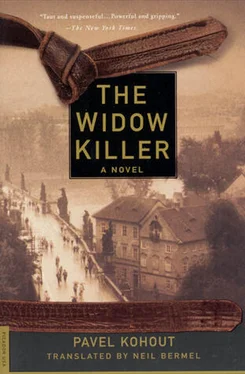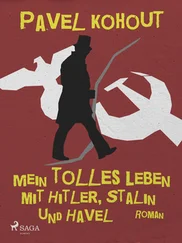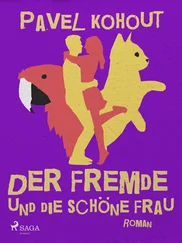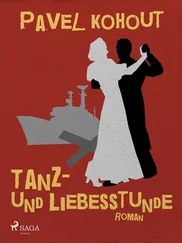Morava had never frightened easily, despite his peaceful nature. He was from a line of blacksmiths and was never afraid of the older kids; they quickly learned that little Jan would do his level best to return every blow he received. Although at work he saw on a daily basis the horrors people inflict on one another, it had never occurred to him that he himself might become a victim. Strange, but true: love awakened this instinctual, animal fear in him overnight.
He remembered how as a small child he would wake up in the middle of the night, sure that something awful had happened to his mother. In a flannel nightshirt soaked with warm sweat, he would pad to the door of the sitting room where his parents’ solid bed stood, noiselessly open it, and strain his ears to catch his mother’s soft breathing beneath his father’s loud snores. If he was unsure, he would glide up to the frame, confirming with a careful touch that her hand and cheek were still warm. Although his father was a tall, sturdy man, Jan could not imagine him surviving without her.
More than twenty years later, a similar fear consumed him that an evil force would rip Jitka from his life. While they were making love, death was absurd; together they formed a magnetic field that repelled all harm. However, once he released her from his embrace, she seemed all the more vulnerable, and so he continued to hold her long after the alarm clock rang.
That March morning the heady scent of live soil wafted into their attic from Vy  ehrad, Císa
ehrad, Císa  ská Louka, and the fields of Pankrác and Braník. Ever since he had come to Prague he had lived near the center, and despite the spartan police dormitory room he inhabited, he never tired of the city. My grass is now asphalt and my trees chimneys, he had once written home, scandalizing his mother. From the first he had fit into the city like a native, and he realized belatedly what a wise move it had been not to take over the family smithy. The only thing he occasionally missed were the smells of the land, which at home had told him as he woke what nature and the weather had in store.
ská Louka, and the fields of Pankrác and Braník. Ever since he had come to Prague he had lived near the center, and despite the spartan police dormitory room he inhabited, he never tired of the city. My grass is now asphalt and my trees chimneys, he had once written home, scandalizing his mother. From the first he had fit into the city like a native, and he realized belatedly what a wise move it had been not to take over the family smithy. The only thing he occasionally missed were the smells of the land, which at home had told him as he woke what nature and the weather had in store.
That pungent reek, he knew, marked the point when winter suddenly relaxes its grip and sprouting begins. Years earlier, his grandfather had led him onto the dike of the pond and pointed his callused finger at the frozen surface, just minutes before a great expanse of it suddenly cracked in half with a dark thunder, the liberated water gushing forth from the rift.
Morava was sure that scene would repeat itself this morning, but he did not feel the country boy’s customary joy at winter’s end; instead, fear coursed through him, sharpening as his feelings for Jitka grew stronger.
Tears sprang to his eyes; never had he felt anything like this, not even when his father died. He did not realize that she could see his face.
“Are you crying?” He heard the surprise in her voice.
Unable to speak, he nodded.
“But why?”
“I’m afraid for you.”
“But why…?” she repeated, puzzled.
It was the first time he had voiced his fear that they were both trapped in the lions’ den. If the war reached Prague, neither Germans nor patriots would be gentle with the Protectorate’s functionaries; the dirtier their own hands were, the fiercer they would be.
“When it looks like the end is near, Jitka, you have to get out of Bartolom  jská at any cost.”
jská at any cost.”
“Where should I go?”
“Definitely not home, the front will come that way and they might tar you with the mess your father’s in. You can stay here a couple of days, at worst in the cellar. I’ll tell Beran not to look for you, he’ll certainly understand. Just promise me, if by some chance I’m not here, that at the first sign of danger you’ll do what I said.”
“And you…?” she said, without understanding.
“I have to stay with Beran, but don’t worry about me; I can take care of myself.”
He could see her eyes begin to draw back, and didn’t understand at first what was happening. She pulled away from him, rolled onto her back, and threw off the thin quilt. Light had begun to filter into the room, and for the first time he both felt and saw her naked. Her white body, with its full breasts and the shadow of her sex, seemed even more defenseless than before.
“Jan, I’ll do as you say, but I also have a request.”
“Yes?”
She spoke self-assuredly, in a voice that rang with a mother’s severity.
“On the off chance that you can’t take care of yourself, I at least want to have your child.”
At eight hundred hours Chief Inspector Buback was meeting with Colonel Meckerle. So far, he informed him, he had no reason to criticize the Prague criminal police in their investigation. The Czechs had swiftly collected data on all the sadistic murders from the beginning of the century onward; their records stretched back to the Austro-Hungarian Empire.
It was three weeks since Buback had settled into the office they hastily cleared for him on Bartolom  jská Street. After appearing there at random on an almost daily basis, he was reporting on what he had observed.
jská Street. After appearing there at random on an almost daily basis, he was reporting on what he had observed.
“I haven’t found the slightest sign of activity outside the purview of the criminal police. Superintendent Beran has apparently stayed true to his prewar principle that police work should remain apolitical. As far as the Gestapo is aware, only one of Beran’s subordinates violated that commandment — the one who was subsequently executed in July 1942 for sympathizing with Reinhard Heydrich’s assassination. His guilt, however, is questionable, since his accuser was an informer he had jailed several times for fraud.”
Meckerle, tightly wedged into a chair that would have comfortably fit two normal men, smirked knowingly.
“Now comes the ’but.’ ”
Buback nodded. His supervisor did not have many likable traits, but at least he was direct; long speeches bored Meckerle and brought out his aggressive side.
“Despite this I do not believe Commissioner Rajner’s assertion that the professional departments of the police will remain loyal to us; Rajner is completely in the dark. Although none of the Czech detectives sense or even imagine that I understand them, there is a heightened vigilance in my presence. My frequent visits have blunted this somewhat, and not all of the Czechs manage to hide all their feelings. What’s especially interesting is the mood early in the morning, when people trade fresh news and rumors. Even if they aren’t listening to enemy radio themselves, the Protectorate’s newspapers unfortunately give them more than enough information; the names of eastern cities in the old Czechoslovak Republic appear more and more frequently in announcements from the Reich armed forces high command. During their morning break for rye coffee or herb tea — which they brew up by the hundred-liter — there is a palpable air of excitement throughout the building. Now and then one of them will even drop the pretense of decorum in my presence.”
“Do we have an agent in the building?”
“Two, in fact: one is a technician, the primary one is the garage manager. Their reports are muddled, and all I can read from them is that they no longer believe Germany will eventually prevail, and that they are afraid for their own skins. To judge by what happened in the Netherlands, they will be the first to stab us in the back, if it gives them an alibi. Things will certainly be even worse in the operations units of the Czech police, since they are part of the repressive apparatus of a collaborationist government. As the front moves closer to Prague, the danger will grow that they’ll turn against us at the eleventh hour to rehabilitate themselves.”
Читать дальше

 ehrad, Císa
ehrad, Císa  ská Louka, and the fields of Pankrác and Braník. Ever since he had come to Prague he had lived near the center, and despite the spartan police dormitory room he inhabited, he never tired of the city. My grass is now asphalt and my trees chimneys, he had once written home, scandalizing his mother. From the first he had fit into the city like a native, and he realized belatedly what a wise move it had been not to take over the family smithy. The only thing he occasionally missed were the smells of the land, which at home had told him as he woke what nature and the weather had in store.
ská Louka, and the fields of Pankrác and Braník. Ever since he had come to Prague he had lived near the center, and despite the spartan police dormitory room he inhabited, he never tired of the city. My grass is now asphalt and my trees chimneys, he had once written home, scandalizing his mother. From the first he had fit into the city like a native, and he realized belatedly what a wise move it had been not to take over the family smithy. The only thing he occasionally missed were the smells of the land, which at home had told him as he woke what nature and the weather had in store. jská at any cost.”
jská at any cost.”










